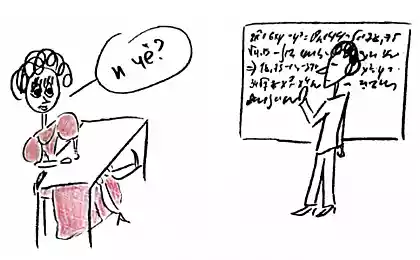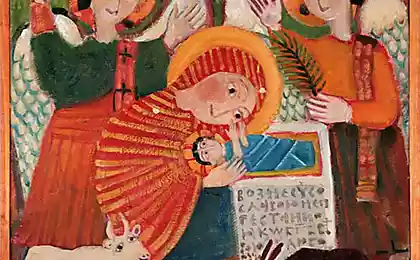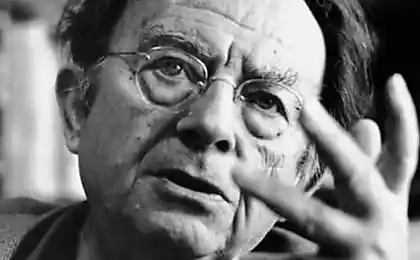922
David Fitzgerald: "We still have no evidence of the existence of Jesus Christ"
A new look at the Gospel sobytiyaIisus Christ, according to the writer and leading activist atheists, was probably the result of the merger of several stories about different people.

David Fitzgerald, an atheist writer in San Francisco, believes that it can present convincing evidence that Christ did not exist. He argues that there is no mention of Jesus, related to the historical period in which he was supposed to have lived, and points to inconsistencies in the early Gospels of Mark, Matthew and Luke.
In an interview with MailOnline he said: "There is a paradox - on the one hand, Jesus did wonderful things and learned amazing things, on the other hand, none of it had heard out of his cult for nearly a hundred years, which could mean that he did not do all all these things ».
Mr. Fitzgerald, whose first book called "The Crucifixion: Ten Christian myths, showing that Jesus did not exist," was published in 2010, believes that it is unreasonable to assume that at the origins of Christianity can stand only one historical figure.
According to him, the early Christians borrowed many rituals from other faiths and cults of the first century. The cult of John the Baptist is one such example, and originally it was a competitor of the cult of Christ.
Mr Fitzgerald said: "We have no mention of Jesus in other historical texts of the time. At that time there were only people who write about Judah, like Philo. & lt; ... & gt; During the historical period was a lot of messiahs and those who imitate them. They have done much less interesting things than Jesus, but they managed something that he could not - leave a trace in the historical record ».
The earliest mention of Jesus considered the ossuary of limestone, on which was written "James, son of Joseph, brother of Jesus».
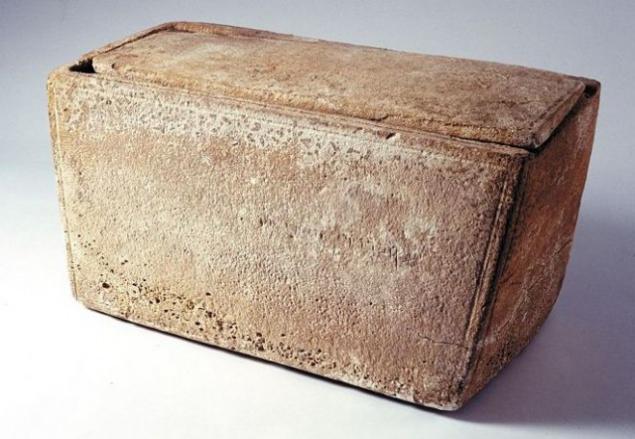
This box is dated year 64 AD, that is, after a few decades after the crucifixion, was confiscated by the Israel Antiquities Authority and its owner in 2003, he was arrested for forgery. And although later, in 2012, he was acquitted, doubts about the authenticity of the above inscriptions still remain.
The non-Christian sources, there are two references to Jesus. They also used to study the reality of Jesus.
Jesus is referred to Joseph in "Jewish Antiquities", written about 94 AD. The Roman historian Tacitus mentions Christ and his execution by Pontius Pilate in his Chronicle, which was written around 116 AD. Both references are made much later than the expected penalty.
The Gospel of Mark, Matthew and Luke, too, have a question, in particular, "there is no evidence of a tradition which would allow the release Barabbas, a murderer and a rebel, freedom, and thus the execution of an innocent Jesus».

Valerie Tariq, columnist blog Alternet.org results "5 reasons to argue that Jesus never existed" in his article, based on Fitzgerald's previous book (the translation of "The New York Times»):
1. There is no secular evidence from the first century, confirming the reality of Yeshua ben IosifaVot as stated Bart Ehrman: "What do they say about Jesus pagan authors of his era? It's nothing. Oddly enough, none of his pagan contemporaries, does not even mention Jesus. There is no record of the birth, any court records, no death certificates. No expressions of interest, hands-free slander and reservation, not even a mention in passing - nothing.
In fact, if you expand the field of view, capturing a few years after his death, even to include the whole of the first century AD, we do not find a single reference to Jesus in any non-Christian and non-Jewish source. I would like to emphasize that we have a large number of documents of the time - for example, the works of poets, philosophers, historians, scientists, government officials write, not to mention the largest collection of inscriptions on stones, private letters and legal documents on papyrus. Nowhere, in any document, in any record never mentioned the name of Jesus ».
2. The earliest Gospel writers, it seems, had no idea about the details of Jesus' life, which crystallized in the later tekstahNikakih Magi, star in the east, there are no miracles. Historians have long been puzzled by the "silence of Paul" on the basic facts of the biography and teachings of Jesus. Paul refers to the authority of Jesus, when it can help in its arguments. Moreover, he never calls the twelve disciples of Christ. In fact, he says nothing about the existence of his disciples and followers - or that Jesus performed miracles and spoke with sermons. In fact, Paul refuses to disclose the biographical details, and those few mysterious hints that he does not just vague and uncertain - they are contrary to the Gospel.
The leaders of the early Christian movement in Jerusalem, such as Peter and James, were allegedly followers of Christ, but Paul speaks of them scornfully, saying that they - no, and repeatedly opposed them because they are not true Christians!
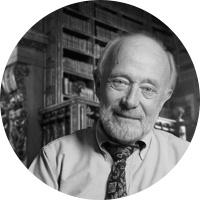
The liberal theologian Marcus Borg believes that people read the books of the New Testament in chronological order, in order to clearly understand how early Christianity was conceived. "What is the gospel when Paul makes it clear that as a written document, it is not a source of early Christianity and its product. The New Testament, or the good news of Jesus existed before the Gospel. This is the result of early Christian communities a few decades after the historical life of Jesus, tells us about how these communities assess its value in its historical context ».
3. Even the stories of the New Testament does not claim to be the report of the first ustSeychas we know that the names of the four books of the Gospel of St. Matthew, Mark, Luke and John were given, but they were not written by them. Authorship was attributed to them somewhere in the second century, or more than 100 years after the alleged date of the birth of Christianity. For a variety of reasons, the practice of using pseudonyms at the time was generally accepted, and many documents of the time, "signed" by famous people.
The same can be said about the letters of the New Testament, except for a few letters from Paul (6 of 13), which are considered authentic. But even in the descriptions of the gospel never to pronounce the phrase "I was there." Rather, there is sound statements about the existence of other witnesses, and this is a phenomenon familiar to those who have heard the phrase "one grandmother said ...»
4. The Book of the Gospel, our only stories about the existence of Jesus, contradict each druguEvangelie Mark is considered the early life of Jesus, and linguistic analysis indicates that Luke and Matthew just redesigned brand by adding your own changes and new material. But they contradict each other and to an even greater extent contrary to the later Gospel of John, as they were written for different purposes and for different audiences. Incongruous stories of Easter - is just one example of how much of these inconsistencies.
5. Modern scientists claim to have discovered the real historical Jesus, describe completely different lichnostiTam have a cynical philosopher, charismatic Hasid, a liberal Pharisee, a Conservative rabbi, a revolutionary fanatic, non-violent pacifist and other characters, a long list of which was Price. According to him, "Jesus of history (if any exist) could well be the king-messiah, a progressive Pharisee, a Galilean shaman, magician, or the ancient Greek sage. But all of them at the same time, he could not have. " John Dominic Crossan complained that such "amazing diversity causes confusion in academia».

Based on this and other points, Fitzgerald concludes that it considers inevitable:
It seems that Jesus - a consequence, not the cause of Christianity. Paul and the other of the first generations of Christians have studied the Septuagint - translation of the Scriptures from Hebrew - to create the mystery of the faith for the Jews with pagan rituals such as the breaking of bread, a Gnostic term in the messages, as well as personal savior God, who is not inferior to other gods of the old Egyptian, Persian, Greek and Roman tradition.
via www.dailymail.co.uk/sciencetech/article-3018471/Jesus-MYTH-Christ-stories-appeared-decades-death-probably-people-just-one-writer-claims.html

David Fitzgerald, an atheist writer in San Francisco, believes that it can present convincing evidence that Christ did not exist. He argues that there is no mention of Jesus, related to the historical period in which he was supposed to have lived, and points to inconsistencies in the early Gospels of Mark, Matthew and Luke.
In an interview with MailOnline he said: "There is a paradox - on the one hand, Jesus did wonderful things and learned amazing things, on the other hand, none of it had heard out of his cult for nearly a hundred years, which could mean that he did not do all all these things ».
Mr. Fitzgerald, whose first book called "The Crucifixion: Ten Christian myths, showing that Jesus did not exist," was published in 2010, believes that it is unreasonable to assume that at the origins of Christianity can stand only one historical figure.
According to him, the early Christians borrowed many rituals from other faiths and cults of the first century. The cult of John the Baptist is one such example, and originally it was a competitor of the cult of Christ.
Mr Fitzgerald said: "We have no mention of Jesus in other historical texts of the time. At that time there were only people who write about Judah, like Philo. & lt; ... & gt; During the historical period was a lot of messiahs and those who imitate them. They have done much less interesting things than Jesus, but they managed something that he could not - leave a trace in the historical record ».
The earliest mention of Jesus considered the ossuary of limestone, on which was written "James, son of Joseph, brother of Jesus».

This box is dated year 64 AD, that is, after a few decades after the crucifixion, was confiscated by the Israel Antiquities Authority and its owner in 2003, he was arrested for forgery. And although later, in 2012, he was acquitted, doubts about the authenticity of the above inscriptions still remain.
The non-Christian sources, there are two references to Jesus. They also used to study the reality of Jesus.
Jesus is referred to Joseph in "Jewish Antiquities", written about 94 AD. The Roman historian Tacitus mentions Christ and his execution by Pontius Pilate in his Chronicle, which was written around 116 AD. Both references are made much later than the expected penalty.
The Gospel of Mark, Matthew and Luke, too, have a question, in particular, "there is no evidence of a tradition which would allow the release Barabbas, a murderer and a rebel, freedom, and thus the execution of an innocent Jesus».

Valerie Tariq, columnist blog Alternet.org results "5 reasons to argue that Jesus never existed" in his article, based on Fitzgerald's previous book (the translation of "The New York Times»):
1. There is no secular evidence from the first century, confirming the reality of Yeshua ben IosifaVot as stated Bart Ehrman: "What do they say about Jesus pagan authors of his era? It's nothing. Oddly enough, none of his pagan contemporaries, does not even mention Jesus. There is no record of the birth, any court records, no death certificates. No expressions of interest, hands-free slander and reservation, not even a mention in passing - nothing.
In fact, if you expand the field of view, capturing a few years after his death, even to include the whole of the first century AD, we do not find a single reference to Jesus in any non-Christian and non-Jewish source. I would like to emphasize that we have a large number of documents of the time - for example, the works of poets, philosophers, historians, scientists, government officials write, not to mention the largest collection of inscriptions on stones, private letters and legal documents on papyrus. Nowhere, in any document, in any record never mentioned the name of Jesus ».
2. The earliest Gospel writers, it seems, had no idea about the details of Jesus' life, which crystallized in the later tekstahNikakih Magi, star in the east, there are no miracles. Historians have long been puzzled by the "silence of Paul" on the basic facts of the biography and teachings of Jesus. Paul refers to the authority of Jesus, when it can help in its arguments. Moreover, he never calls the twelve disciples of Christ. In fact, he says nothing about the existence of his disciples and followers - or that Jesus performed miracles and spoke with sermons. In fact, Paul refuses to disclose the biographical details, and those few mysterious hints that he does not just vague and uncertain - they are contrary to the Gospel.
The leaders of the early Christian movement in Jerusalem, such as Peter and James, were allegedly followers of Christ, but Paul speaks of them scornfully, saying that they - no, and repeatedly opposed them because they are not true Christians!

The liberal theologian Marcus Borg believes that people read the books of the New Testament in chronological order, in order to clearly understand how early Christianity was conceived. "What is the gospel when Paul makes it clear that as a written document, it is not a source of early Christianity and its product. The New Testament, or the good news of Jesus existed before the Gospel. This is the result of early Christian communities a few decades after the historical life of Jesus, tells us about how these communities assess its value in its historical context ».
3. Even the stories of the New Testament does not claim to be the report of the first ustSeychas we know that the names of the four books of the Gospel of St. Matthew, Mark, Luke and John were given, but they were not written by them. Authorship was attributed to them somewhere in the second century, or more than 100 years after the alleged date of the birth of Christianity. For a variety of reasons, the practice of using pseudonyms at the time was generally accepted, and many documents of the time, "signed" by famous people.
The same can be said about the letters of the New Testament, except for a few letters from Paul (6 of 13), which are considered authentic. But even in the descriptions of the gospel never to pronounce the phrase "I was there." Rather, there is sound statements about the existence of other witnesses, and this is a phenomenon familiar to those who have heard the phrase "one grandmother said ...»
4. The Book of the Gospel, our only stories about the existence of Jesus, contradict each druguEvangelie Mark is considered the early life of Jesus, and linguistic analysis indicates that Luke and Matthew just redesigned brand by adding your own changes and new material. But they contradict each other and to an even greater extent contrary to the later Gospel of John, as they were written for different purposes and for different audiences. Incongruous stories of Easter - is just one example of how much of these inconsistencies.
5. Modern scientists claim to have discovered the real historical Jesus, describe completely different lichnostiTam have a cynical philosopher, charismatic Hasid, a liberal Pharisee, a Conservative rabbi, a revolutionary fanatic, non-violent pacifist and other characters, a long list of which was Price. According to him, "Jesus of history (if any exist) could well be the king-messiah, a progressive Pharisee, a Galilean shaman, magician, or the ancient Greek sage. But all of them at the same time, he could not have. " John Dominic Crossan complained that such "amazing diversity causes confusion in academia».

Based on this and other points, Fitzgerald concludes that it considers inevitable:
It seems that Jesus - a consequence, not the cause of Christianity. Paul and the other of the first generations of Christians have studied the Septuagint - translation of the Scriptures from Hebrew - to create the mystery of the faith for the Jews with pagan rituals such as the breaking of bread, a Gnostic term in the messages, as well as personal savior God, who is not inferior to other gods of the old Egyptian, Persian, Greek and Roman tradition.
via www.dailymail.co.uk/sciencetech/article-3018471/Jesus-MYTH-Christ-stories-appeared-decades-death-probably-people-just-one-writer-claims.html
How to count calories
The oldest pyramid in the world can testify to the existence of a mysterious civilization





